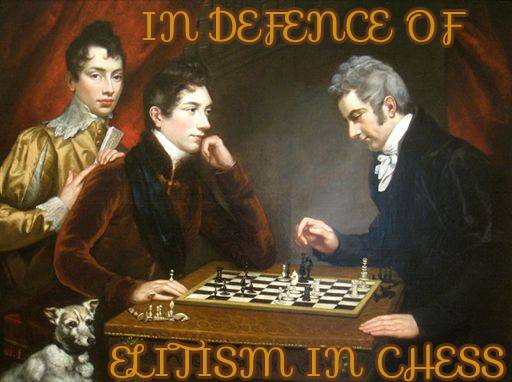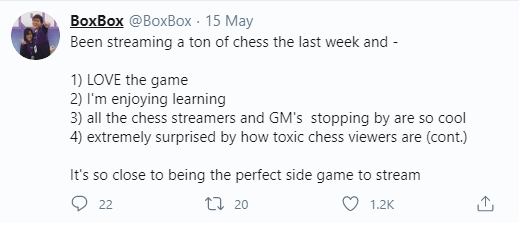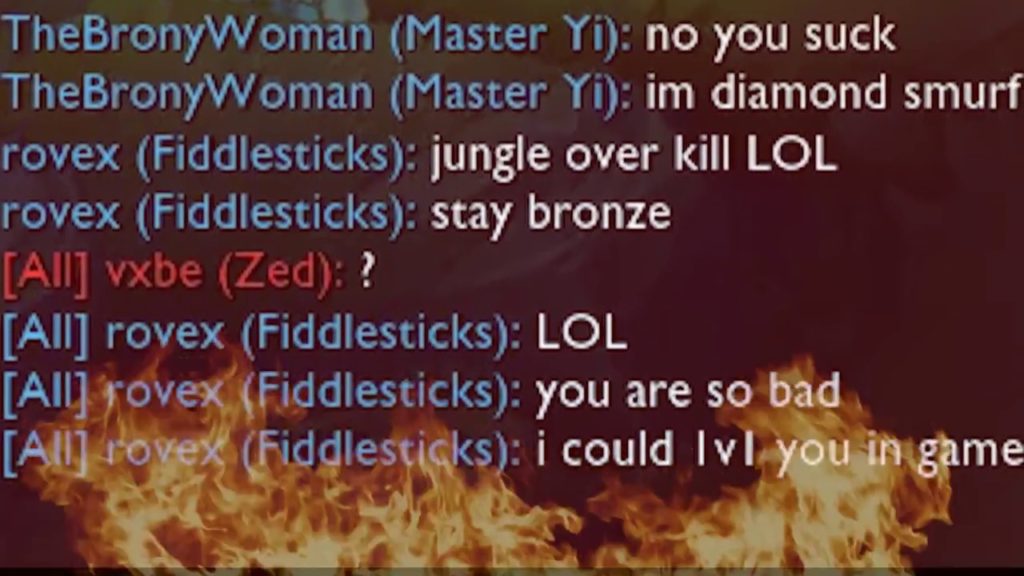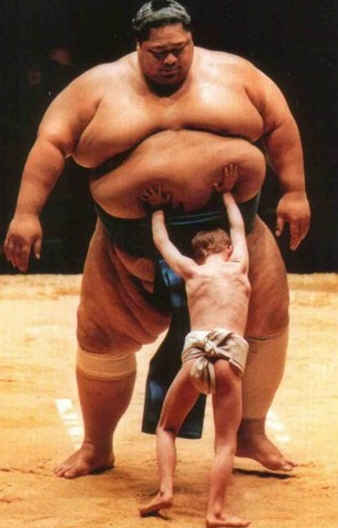Table of Contents
Introduction
In the previous post on this blog, I made an overview of the events in 2020 that led to the real boom of online chess and its unprecedented popularity.
Unfortunately, as with almost everything happening online, 1 this boom couldn’t have gone without its share of outrage and drama. Due to the fact that some chess players weren’t quite receptive to the influx of the new/inexperienced players in the chess community, 2 it became increasingly common to refer to them as “gatekeeping elitist”, a term that can roughly be translated as “a**holes who think they are better than other people because they are experienced/good at a certain activity and who would like to prevent anyone new from taking up the same activity just because they are bad at it”. 3
Now, even though I definitely agree there are certain chess players who fit that exact description, I think that we are talking about a relatively small minority and that elitism accusations in chess have gotten out of hand. I think that the negative tendencies connected to the online world, the attention economy we live in, our habit to look everything in black & white perspective have blown the stories of elitism out of proportions.
In this article, I will come to the defence of elitism in chess and try to explain why I think elitism accusations in chess are vastly exaggerated.
Elitism in chess – an overview of recent events
In order to understand more vividly the details of the drama that unfolded in recent weeks and how exactly the term “Elitism in chess” became so popular, let’s take a look at an overview of the most important recent events that led to the current state of affairs:
- Hikaru Nakamura starts collaborating with famous Overwatch Streamer xQc
- Other popular streamers (most notably Boxbox, Hutch, Voyboy) start streaming chess more regularly and collaborating with Nakamura and other chess streamers
- League of Legend streamer Boxbox posts a tweet in which he points out the toxicity of chess viewers:
- GM Ben Finegold goes on an anti-XQC rant on the stream calling xQc, Boxbox and Nakamura names 4
- Ben Finegold gets backlashed – especially by xQc’s community. Terms “Gatekeeping” and “Elitism” start appearing.
- Streamer and Youtuber Mo1stCr1tikal/penguinz0/Charlie makes a video Chess Drama in which he also talks about gatekeeping and elitism in chess. 5
- Nakamura reacts to Ben’s clip and Charlie’s video and reiterates the elitism narrative
- Agadmator makes a video in which he talks about his own experience with elitism
- chesscom launches the 50 000 $ worth chess tournament for 16 popular streamers called Pogchamps.
- Arguments on both sides become more polarized. Website Chesstech posts a highly controversial article titled “Is PogChamps a good way to promote chess?”
- Agadmator makes another video in which he comments on the article and asks his viewers for the opinion
- Nakamura reacts to the article and Agadmator’s video on his stream and posts it on youtube
- Elitism in chess becomes widespread and heatedly debated
- A talented chess writer 6 comes to the rescue of elitists as he writes an article titled In Defense of Elitism in Chess in which he demonstrates that claims about elitism in chess are vastly exaggerated 7
What – you have doubts about that last point, you say? Please, read on! In the remainder of the article, I will try to make my case in the form of 7 reasons why elitism accusations in chess are vastly exaggerated.
7 reasons why elitism accusations in chess are vastly exaggerated
Elitism is not only present in chess, but in every human field
When accusations of elitism in chess started appearing in my feeds, 8 I noticed they heavily implied that elitism is something characteristic, almost unique for chess.
Now, my main problem with this argument is that it is simply not true. In my life, I have had the opportunity to actively participate in many fields and become a member of many different communities. In every single one of them, I experienced elitism in one form or another.
Table tennis? In the majority of Croatian clubs, you rarely get the opportunity to play even friendly matches with players better than you, let alone entire practice sessions. Hell, I have had instances where they wouldn’t even greet me, despite training in the same hall for years.
Salsa? Some people don’t want to dance with beginners at all. Quite often they are very dismissive/jeering toward the newcomers. 9
And don’t even get me started of electrical engineering. In my 4 years, I have witnessed more elitism than in all other areas of my life combined. People judging each other one the basis of their knowledge, “macho, alfa” males trying to demonstrate they are better than you because they are so smart, meetings reverting down to the general “dick measuring contest”. Disgusting.
Not to mention all other fields that are beyond the scope of this article where elitism is present. 10
Put simply, there are people who like to judge others on the basis of how good they are at something instead of how good people everywhere.
The second very common argument “for” elitism in chess states that other online communities are much more receptive toward beginners. Boxbox’s tweet mentioned earlier very directly implied that he has never experienced so many degrading comments when he played League of Legends. 11
However, I don’t buy that argument either. I don’t know BoxBox’s content that well, but I am curious if he ever streamed a game where he was a beginner to thousands of people until he started streaming chess.
In my life, I have played both DOTA2 and LOL (and a bunch of other games) and those communities were very toxic, elitist and DEFINITELY NOT beginner-friendly.
(Ahhhh, look at those League of Legend players being welcoming toward beginner players. Is it really surprising for a game in which notorious flamer Tyler1 is one of the legends of the game?)
I am pretty convinced if BoxBox took up any game that has a mildly competitive scene, he would get nasty comments. If we take a look at xQc’s streams, people laugh at him and insult him irrespective of the game he plays. They mocked him for sucking at a bunch of other games long before he started playing chess.
Therefore, I firmly believe that the chess community is no fundamentally different from any other community. I would argue that elitism is not a chess-player’s trait, but rather a human trait.
And before you jump at my throat – NO, that doesn’t mean it is okay to do it when you are a chess player because “everybody else is doing it”.
It just means that the assholes are present everywhere.
I also believe they are not nearly as prevalent in any of the given fields, as it is sometimes presented. I think a large part of the blame for this eschewed perception goes to the greatest invention in the last century.
The Internet. 12
Elitism is more exaggerated on the Internet a.k.a. the dangers of generalization
Another big problem I have had with the recent elitism accusations is that people have taken notice of the behaviour of a relative MINORITY of people that manifested itself in an ONLINE world and then attributed it to the entire population.
Let’s be frank – the Internet can be a shitty place. When provided with anonymity and a keyboard, people are more likely to turn into assholes. Internet trolls craving for attention are loud and offensive and prone to looking for “weaker” targets – like female streamers or new players.
However, concluding an entire group of people is elitist on a relatively small (yet loud) sample is a dangerous generalization. I found it rather amusing that many new players who shouted “gatekeeping elitist” accusations formed this opinion on the basis of the Twitch Chat, without ever visiting a chess club or meeting a group of chess players in person.
In my experience, chess clubs are full of friendly and nice people united by their mutual passion and love for the game. The majority of chess-players in real-life are warm and receptive toward new players and I believe it is highly inaccurate to generalize an entire group on the basis of the behavior of certain individuals. 13 I would highly recommend any newcomer to visit the nearest chess club first and avoid the Internet before forming an opinion on an entire community.
Of course, that does not mean there are not rude people inside the community. It is also quite true there is a number of… peculiar… people playing the game. I will be the first to mock and laugh at chess stereotypes and say many of them are true.
However, just because someone takes losses badly or if someone is not too socially adept does not make him an elitist.
Which brings to the next point.
Being socially awkward/shy DOES NOT make you an elitist
In the afore-mentioned video in which he talked with his own experience with elitism, Agadmator told a story about how he participated in a certain competition where Croatian Grandmasters were also playing and how he found completely unapproachable. He mentioned they were mainly sticking together as a “clan” and communicating with lower-rated players at all.
I have to admit, I used to share his viewpoint in the past. My early experiences in chess tournaments were very similar – I had the feeling that the division between high-rated and lower-rated tiers is natural and that one should not just start talking to a Grandmaster for no reason.
Mind you, some of it was not unfounded – for example, I do recall one Grandmaster claiming it is offensive for a lower-rated player to offer a draw to someone with the title. But even so – in the last couple of years – I have had the opportunity to interact with many of them in various forms and realized they are very nice, interesting and intelligent human beings. I realized that them seeming unapproachable had something to do with MY ASSUMPTION and PROJECTION that they wouldn’t be interested in talking to me in the first place.
Back then, I realized I didn’t even try talking to them. Considering that many chess players are on the introverted/shy side of the social spectrum, that first contact was of particular importance. It was easier to label them as elitists than to even give them an opportunity.
The claim that grandmasters are elitist because they mainly hang with other grandmasters also doesn’t make all that sense. Since Grandmasters are relatively famous in social circles, many chess players exhibit traits of fanboyism and expect they are entitled to Grandmaster’s attention. Is it really so difficult to understand that someone would prefer not to talk to anyone before a game or hang out with people he has known for years, 14 rather than with complete strangers?
It has to be mentioned I am not the only one with this opinion. Even though I came up with the arguments in this article on my own, subsequent research made me aware of the video posted on Mordimer’s Chess Channel, in which Mordimer makes many interesting points similar to what I have been advocating:
I particularly liked his arguments about the importance of initiating interaction and the timing of interaction. How the abuse of the latter can have dire consequences is best illustrated by a real-life story that happened in one Croatian tournament.
Multiple Croatian champion and former European champion Zdenko Kožul was playing a tense game in which he was winning. Yet, he somehow failed to find the knock-out blow and failed to convert his position 15 After the game, a certain 2100 Croatian Candidate Master (who was NOT on very good terms with him) approached him and said: “Hey, how could you not play Nd5 there, you were completely winning!” Kožul, of course, looked at him angrily, ignored him completely and stormed from the room.
Does getting annoyed by an insensitive chess player with zero social intelligence make him an elitist?
I’d say it makes him a normal human being.
Stating someone is bad in chess (when they obviously are) DOES NOT make you an elitist
Another thing I have noticed by watching chess streams in the last couple of weeks is the slow shift of paradigm from “It is not okay to laugh at people and insult them because they are bad at chess” to “It is not okay to state anyone is bad at chess”. Somehow, stating someone is bad in chess (even when they obviously are) is a sign of a “gatekeeping elitism”.
I strongly disagree with this “political correctness” and tendency to twist the truth in order for people to feel better about themselves. In recent months, I have noticed many iterations of the question “I am rated (Insert random rating number from 200-1000), am I good at chess?”, appearing on Quora, which simply “reek” of the desperate need of validation from an unknown stranger on the Internet.
We can pretend all we want and put the titles like this in our videos:
but if a 600 rated player can’t be regarded as “bad” then the meaning of the word “good” has lost all its meaning. The man lost a game in 6 moves as White just a couple of weeks later, for Christ sake!
And it is not surprising – he has been playing chess only for a very short period of time and hasn’t spent a lot of time on the game. What else can be expected, really? There is nothing shameful about it, nor nothing elitist about stating that the “king is naked”. As Nakamura pointed out, any chess player would be equally bad at Overwatch – a game in which xQc has reached Grandmaster status.
Anyway, I don’t understand our culture’s constant need to coddle everybody’s mind and make them feel good. I have a strong suspicion this is yet another extension of the prevalent “Power of Positivity” psychology that is currently dominating self-help industry and social media.
I think these attempts to misrepresent our flaws, the refusal to accept that we all suck at something is severely detrimental to our mental health. Insisting that we are always happy and all good at everything we do sets unrealistic, superhuman expectations, the shattering of which can cause dire consequences and real psychological crisis. 16
(Power of positivity – the worst thing to happen to humanity since the invention of the London System)
Of course, I am not advocating to go around and flame bad players – it is one thing to have an opinion or answer a question about someone’s skill if they ask you, it is something completely else to go around telling people they suck, insulting them because of that and judging them on that basis.
But even if you do so, it is more accurate to label you as an asshole rather than an elitist.
Although I admit those two terms don’t necessarily exclude each other.
Refusing to play games against MUCH lower-rated players you have never met DOES NOT make you an elitist
Another “chess players are elitist” argument that was mentioned in one of the videos referenced above 17 claimed it is elitist to refuse to play against people who are much lower rated because love in the game is the only thing that should matter.
Since I used to receive daily challenges from lower-rated players on lichess due to which I disabled challenges from anyone with a rating difference >300 and due to the fact I constantly got challenged by people 1000 points rated than myself back when I used to stream more, I felt very strongly 18 against this argument.
I think there is nothing wrong with not wanting to play with much lower-rated players. For me personally, any activity (including chess) is most interesting when it is competitive and when I am forced to give my best. Whether it is friendly volleyball, a game of cards or a chess game, I like exerting myself to the maximum and to face a challenge.
Playing chess games against 1000 points rated players simply doesn’t present me with such a stimulus. Knowing I can win the majority of these games without thinking makes me lose interest very quickly. I think there is a reason many people advocate playing/practicing against someone similar to your level or slightly better. I also think this trait of mine is not so odd – there are many stories of strong players like Kasparov and Magnus quickly losing interest when faced with much weaker opposition. 19
(Well, at least sumo-wrestlers can’t be accused of being elitists)
Of course, note I am mainly referring to playing with unknown players…via the Internet. I think when facing someone you know or playing with someone over the board is completely different as there are different components that make the game interesting (thrash talking, banter, socializing, etc.).
I think there is nothing odd in preferring to play with people of your own level. I think the craving for a challenge is another natural human trait.
I understand why some might call it unhealthy competitiveness.
But I don’t understand why anyone would call it elitism.
Asking whether someone is qualified for a job in the chess world DOES NOT automatically make you an elitist
Another thing I don’t like about the entire “You’re an elitist” movement is labeling anyone who asks for qualification/credentials as an elitist.
It has to be said this is the borderline area and the argument that is most difficult to defend. There is a very thin line between situations where asking for someone’s qualifications is warranted and situations where the intention is simply to put other people down and imply they shouldn’t be doing what they are doing (irrespective of their qualifications).
Famous Internet content creators are the best example. Agadmator has been very outspoken about the fact he was not very “welcome” in the chess community, in a sense that people told him he shouldn’t be making videos about chess at all. Popular Twitch streamer Alexandra Botez, who regularly co-hosts top chess events, has also been on the receiving end of nasty Internet comments – virtually her any appearance in a show run by chess.com leads to endless “Why is a WFM there” stream of comments.
However, just because there are areas where qualifications are not required doesn’t mean it is true for ALL areas (or that given person is qualified for any endeavor related to their field).
For example, it is quite retarded to flame Agadmator for his chess expertise because he himself points out he is merely trying to create content for people to enjoy and hints he leans more toward entertainment. He himself pointed out there are strong Grandmasters like Peter Svidler who do high-level analysis. 20
On the other hand, if he were suddenly to start making training videos and promising he can get anyone who follows his method to a Master Level, question such as “On the basis of which credentials do you make these claims” would be quite logical and not elitist at all.
Similarly, claiming Alexandra Botez shouldn’t appear at ANY show is plain stupid, considering she is a decent player, and a fantastic communicator capable of making the games more approachable to an average Joe. However, questioning whether she would be qualified to broadcast a World Championship Match on her own, for example, is not elitist. I don’t think any 2100 player 21 is capable of understanding fully all the intricacies of such a high-level chess. 22
Opposing attempts to “modernize”, “improve”, “change” or “sexify” chess DOES NOT make you an elitist
Last, but not least, after the surge of popularity of chess on Twitch and especially after the announcement of Pogchamps tournament, some chess players expressed their dislike with the prevalent notion that chess needs to be modernized, sexified and brought to the 21st century entertainment standards in order not to be left behind.
It didn’t take long for them to be proclaimed “elitist”. Anyone who voiced even the slightest counter-arguments against “improving chess” or “growing the game” was crucified and faced with numerous “imagine being such a fool you want people to respect A BOARD GAME” type of comments.
Well, I seem to be one such fool.
I strongly believe chess is perfect as it is and that it doesn’t need to be “changed”, “improved” or “sexified”. Nowadays, these complaints are very common today. For quite some time, many people have been constantly advocating Fischer’s Random or shorter time controls and even Kramnik himself proposed and advocated the no-castling variant after he retired.
This is nothing new. Claims that chess is boring and “dead” have been constantly present in the chess culture. The earliest attempts go all the way to 1930s when Capablanca first played certain variants because of the potential “drawing death of the game”. We all know how accurate that assessment was back then and – as I argued in my Quora answer in regard to the Kramnik variant – the recent appearance of Alpha Zero demonstrates that the same assessment is far from being accurate even today.
I, on the other hand, have always considered that variants are an interesting option that should forever remain – variant. Chess is so rich and interesting and has been doing so well for thousands of years and has been constantly expanding. I completely agree with Peter Heine Nielsen’s attitude that it is a strong brand who doesn’t need to be changed in order to be popularized:
I find claims such as “We didn’t really know how to market chess before Pogchamps” and “Pogchamps finally brought chess to the 21st-century standard” ridiculous. People are trying to present as if events such as Pogchamps are the only way to go about promoting chess and labeling anyone who claims that they are nice but that chess was also doing well before them as “elitist”.
Of course, that is not to say that there is no room for improvement and certain aspects that need to be modernized. But modernization certain practices is not the same as modernization of the game itself.
And the reason I get so annoyed with these claims is – people claiming that chess needs modernization are usually the very same people who complain modern chess is boring.
But, as I argued in yet another Quora answer of mine – claims that modern chess is boring are not the problem of chess.
It is the problem of people.
- And in the 21st century
- Especially on the streaming platform Twitch
- Or something along those lines. +-
- No, I am not posting the link to it, you will have to dig it on your own in other videos linked in this article, you drama-seeking spawn
- After watching this I finally understand how Americans feel when non-American citizens start lecturing them about American culture.
- Not to mention how handsome he is!
- Though he NEVER denies elitism DOESN’T exist, just to nip all potential BuT iF yOu ArE dEfeNdInG iT tHaT mEaNs YoU cLaIm It IsN’t ReAl arguments in the bud. My claim it is a problem, but not nearly as big one as everyone tries to present it these days! I also claim too many people don’t have a clear idea of what elitism is, so they attribute everything to it. But I am getting ahead of myself.
- Yes, feeds in the plural. I, unfortunately, have more than one social media account. I am a millennial and wannabe blogger, what have you expected?
- You might find this hypocritical considering my attitude toward playing beginner players in chess mentioned later in the article. But there are two major differences: A) Salsa can’t really be practice on your own, without a partner and B) Salsa happens in person and includes a social component which is a key difference.
- Hint: Try googling Elitism in music
- Boxbox is primarily a (former) LOL professional player, nowadays full-time streamer.
- Bonus points if you thought “The Jerome Gambit” was the answer.
- In general, it is silly to generalize anything, really.
- Many young Croatian grandmasters grew up together playing in same Junior tournaments and continued their friendship in senior years
- I am not sure if he lost or drew that game, but it is not 100% relevant.
- On a more elaborate read on the potential dangers of the Feel-Good psychology, I highly recommend the following article by my favourite blogger Mark Manson titled The Truth About “The Secret”, while the book The Coddling of the “American Mind: How Good Intentions and Bad Ideas Are Setting Up a Generation for Failure” is also interesting in that regard.
- Or maybe several of them
- And probably quite personally
- And no, I am not comparing myself to Kasparov and Magnus. I just thought they are very good examples.
- Even though his own analysis is not at all that bad and has improved significantly over the years
- Nor a 2200 player like yours truly
- Although female players like Alexandra are more likely to get questioned and asked for “qualification”, but the topic of “sexism in chess” is outside of the scope of this article. Perhaps the very fact I decided to mention her does not do the anti-sexism a service, but I thought it made sense to use her as an example to make a distinction between being a prick and not being one, considering she is very famous and often a target of malicious tongues within the chess community.









Good reading 😉 And thanks for sharing my video…
No problem, my friend! Glad you liked the article! Cheers
Vjeko
Thx for this article. I like how you try to look at all this unecessary drama from different perspectives. Our chess club was always welcoming to new players. Of course there were some bad situations were one player looked down on weaker players because of the moves they made, but these people are in the minority. I also liked your other articles. Very detailed, helpful (thx for your article on the book “the art of checkmate”) and entertaining 🙂 (I hate the london system, too haha. It’s a good opening, but I’m tired of seeing players playing all their plans/moves on autopilot, whether they are appropiate for the current position or not. There were games where I could predict like 30 moves of my opponent. :))) Keep up the good work and all the best:)
Hi Mirko!
Glad you like the article! I am also glad you like my book reviews – unfortunately I don’t have time to write them as much as I would like today :D.
All the best to you too hope we will keep reading each other 🙂
Hey. It’s not been around for “thousands of years” but what was there was taken over by a variant called Shatranj with stalemate and checkmate and then later castling and pieces moving the full length of the board in one turn. In Europe we got pawns moving two squares on the first turn and en passant and finally the latest variant, Chess. We’ve had this variant for more than three hundred years but it’s a fun variant and I hope it stays and names like Morphy and Tal don’t die. In its favour, we have top ten players hailing from all over the world for many years now.
I also think the point on being shy, etc. in elitism is very real and there is a lot of projection that goes on by newer players. If you walk into a random chess club, just for fun as a 2300, you can get a lot of negative vibes from strangers who are lower-rated. I remember once doing this and playing a game and at the end when i started talking variations my opponent drew back and was suddenly distant. I got the feeling that he thought i was making things up actually, lol. Then it became a mutual biography, how long have you played for, etc. After walking around I saw that the general approach to analysis was reflecting on how the positions “feel” and no one was too fluent in notation or remembered the games, so I realized people must find me pretty obnoxious when i blurt out a “forced” idea. The highest rating i think was around 1750. This was years ago when i was still a teenager and I didn’t mind much but i’m sure experts and above who are a little more sensitive than i would not like to relive the experience. It happens sometimes that a strong friend will ask me to come along when he’s going to the club, i never ask or think twice about his motives.
I honestly think the higher up you go the more generous the players get with their chess knowledge, but if you get a bored response it’s probably because they think you aren’t really listening. Like that CM who asked Kožul a question just to prove something. Or they’re tired.
You didn’t defend elitism, you said it was being exaggerated
No they’re saying that most of the attacks at chess elitism is exaggerated and many times untrue. Exaggeration is a form of aggression and purposeful misinformation. The author is trying to clear the misinformation in the drama against chess elitism. Thereby defending it. And I’m pretty sure chess elitism is a stab by itself.